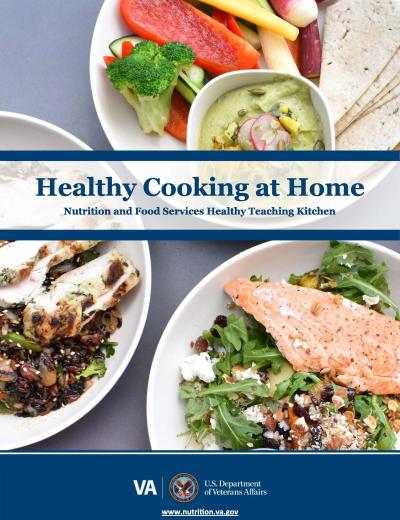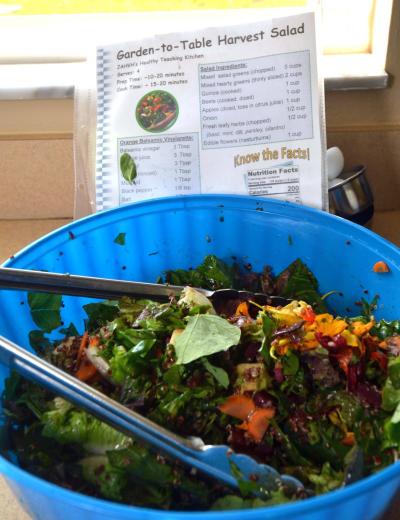Electronic Access
Leverages telehealth, virtual appointments, and electronic medical records to expand access to Food Is Medicine (FIM) interventions for Veterans, their families, and their caregivers.
Diverse Programs
Offers a wide range of FIM programs that address diverse dietary, nutritional, and health needs including its Healthy Teaching Kitchen, Food Hubs, and Produce Prescription Program.
Integrated Services
Integrates FIM services with Veteran health care on both the national and local level through streamlined health records, facility-level coordination, and a unified FIM mission across all VA programs.
Bright Spot Profile
The U.S. Department of Veterans Affairs (VA) is the federal agency that is tasked with providing health care and benefits for the nation’s active duty and retired military personnel, as well as their families and caregivers. The Veterans Health Administration (VHA) oversees Veteran health care; it is the largest integrated health care network in the country, serving 9 million enrolled Veterans and dependents each year at 1,255 health care facilities across the country.
Within the VHA, Nutrition and Food Services addresses Veteran food and nutrition insecurity through a variety of Food Is Medicine (FIM) initiatives. The VA was included in the Bright Spots series to highlight a national health care system that uses innovative and integrated programs to implement FIM interventions for specific populations.
FIM Programs
Healthy Teaching Kitchen to Engage Veterans in Healthy Cooking
Healthy Teaching Kitchen (HTK) is a national experiential nutrition education program for Veterans and an optional “plus one”. The program engages participants in meal planning, grocery shopping, food safety, preparation, cooking, and storage via virtual (VA Video Connect) or face to face classes.
Classes encourage involvement with hands-on and virtual cook-along modalities. By taking nutrition education into the kitchen, HTK helps bridge the gap to behavior change and actively addresses the burden of chronic and diet-related diseases among Veterans. In 2023, the HTK program had over 30,000 encounters, 70% of which were virtual, which is up from 11,000 encounters in 2021.
Integrating Food Pantries with Dietary and Other Clinical Services
Food Hubs are food pantries that support the provision of food in conjunction with other wrap around services to address social drivers of health and promote access to care in a dignifying environment. Food Hubs aim to provide immediate food relief, promote access and connection to resources and achieve operation excellence through feedback and data sharing.
The Food Security Office within Nutrition and Food Services is currently implementing Food Hubs across the country. At each of these sites, dietitians use participants’ medical records to make recommendations on which foods participants should choose from the pantry.
Dietitians also connect participants to additional clinical care services as needed. Social workers meet with participants to address other unmet health-related social needs, such as transportation and housing and connect participants with additional services to address those needs.
Produce Prescription Program Provide Fresh Foods Alongside Nutrition Education
In partnership with The Rockefeller Foundation, the Food Security Office recently launched a pilot Produce Prescription Program for Veterans who were previously identified as food insecure through the Hunger Vital Sign screening tool. The Produce Prescription Program is currently active at two VA sites in Salt Lake City, UT and Houston, TX.
Each month, participants in this 1-year pilot program receive a $100 reloadable debit card that they can use to purchase fresh produce. Participants also receive nutrition education from a registered dietitian.
As of summer 2024, 250 participants have been enrolled at each site, and the Food Security Office anticipates that it will launch additional sites in the near future. As the pilots are ongoing, the Food Security Office in coordination with the University of Utah are conducting research to measure the program’s impact on clinical, operational, and wellness outcomes.
Equitable Initiatives
Electronic Access Expands VA FIM Programs
The VA is expanding the accessibility of its FIM programs through electronic access. The VA delivers nutrition services through its telehealth platform as an alternative to in-person visits. In 2023, the VHA hosted over 140,000 telehealth encounters for nutrition services. To reach Veterans with limited access to internet or smart devices, the VA offers the Digital Divide Consult process to connect Veterans with the technology they need to access telehealth services.
The VA also broadens its reach through Patient Self-Referral Direct Scheduling for nutrition services, which allows Veterans to book appointments with registered dietitians without a referral, streamlining the process of connecting Veterans to the nutrition services they need.
Services Directed to At-risk Populations Ensure Targeted Care
While many nutritional services such as telehealth and the HTK program are available to all Veterans, the VA connects food security with other unmet health-related social needs to deliver more targeted interventions. To screen unmet health-related social needs, the VA launched the Assessing Circumstances and Offering Resources for Needs (ACORN) screening tool, which covers many social risk domains.
The VA compiles information from the ACORN screen into a centralized database that includes other demographic information, including gender, age, period of service, and location. VA clinicians view this information on a data dashboard to gain insights into relationships between nutritional health, social factors, and demographics among Veterans.
Varied and Culturally Appropriate Meal Options Ensure Veterans Are Accommodated
The VA works to accommodate the diverse diets of Veterans. HTK has compiled over 200 online healthy recipes featuring cuisines from around the world to accommodate diverse dietary preferences. Furthermore, clinicians working in Food Hubs and the Produce Prescription Program are trained to meet individual Veterans’ needs to develop a diet that is best suited to their eating preferences.
Success Strategies
A Clear Mission That Resonates
The mission of ensuring that Veterans have access to nutritious food resonates with most Americans, including policymakers. As a result, the VA has little trouble in forging partnerships and garnering support for its FIM programs.
Nutrition services through the VA are now ingrained in U.S. policy, which allows programs administered through the VA to be covered under standard medical care.
Integrated Services
The VA works to fully integrate FIM initiatives into the VA health care system. One way the VA achieves this integration is through its electronic health records, which streamline the exchange of health care information and help providers connect Veterans with the nutrition services they need. Furthermore, the VA also coordinates FIM integration at the facility level to ensure that Veterans have local access to these services.
Next Steps
The VA expects to take the following next steps in its FIM efforts:
- Extend the Produce Prescription Program to two additional VA facilities
- Launch a future pilot program with The Rockefeller Foundation
- Direct more VA facilities to form an interdisciplinary committee dedicated to food security
- Launch five additional pilot grant programs to address food insecurity under The National Defense Authorization Act for Fiscal Year 2024




